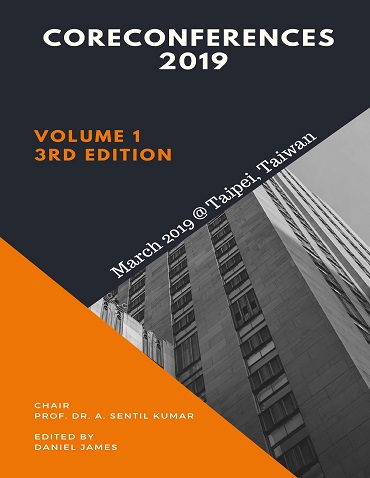- Publication Meta:Value
- Short Title:CC Batch A 2019
- Publisher:ASDF, India
- ISBN 13:978-93-88122-06-1
- ISBN 10:93-88122-06-2
- Language:English
- Type:Hard Bound - Printed Book
- Copyrights:CC Batch A Organizers/DCRC, London, UK
- Editor-in-Chief:Dr A Senthilkumar
- Conference Dates:20 - 21, March 2019
- Venue Country:Taipei, Taiwan
- Submitted Papers:227
- Acceptance Rate:8.51%
- Website:www.coreconferences.com
Welcome to ASDF Electronic Digital Library!
CoreConferences 2019
CoreConferences 2019
International Conference on Universities and Women's Studies 2019
Paper 020
The Customary Stigma and Transphobia among (LGBTQ) in India — A Study on Transgenders in Kerala
Haseena VA1
1Assistant professor & Head of the Department, M.E.S Kalladi College, Kerala, India
Abstract
Kerala is the leading state in India in matter of education, socio–economic development and the related development criteria. Development indicators such as HDI, PQLI, and GDI etc are very high in Kerala. In Kerala as like in other states in India we have a community known as Transgenders. Their population is around 25,000; located in almost all the districts in the state. In the category of LGBTQ (Lesbian, gay, bisex, transgenders and queer) transgenders occupies an important place. Transgender have a recorded history of more than 4,000 years. Asian countries have centuries–old histories of existence of gender–variant males who in the modern's times are labelled as 'transgender women'. India has a history of people with a wide range of transgender related identities, cultures, and experiences. People with such identities include Hijras, Aravanis, Kothis, Jogtas⁄Jogappas, and Shiv–Shakthis. Ancient myths bestow them with special powers to bring luck and fertility. Kama Sutra provides vivid description of sexual life of people with 'third nature' (Tritiya Prakriti). There happened a big crisis in transgender identity in Kerala. Gender variation and gender expression often leads to Transphobia and stigma in Kerala. Automatically there raised a lot of issues in the society made them an unwanted element in the society. These identities have always been part of the broader culture and were treated with great respect in the past though only some are accorded such respect in the present. Our society is, however, very harsh on gender-variant people. Some transgender people have lost their families, their jobs, their homes and their support, they are in lack of social security and omission from economic participation, they face hurdles to use social welfare schemes, degraded health facilities etc. due to shortage of livelihood choices exceptions transgender children may be subject to abuse at home, at school or in their communities. The rights of the transgenders are very essential for keeping their life successful. The child born with some sexual abnormality is abandoned in fear of social stigma. Because of the shortage of mechanisms preventing the violation of rights of transgenders, such persons are easily defrauding the society. Thus, right to life and to live in the family and society is first and essential right. If any practice infringes this right, it will prevent future generation to exist. One of the important successes in the life of transgenders in India is the abolition of Section 377 by the supreme court of India in 2018. Section 377, plainly read, punishes with imprisonment for life or for a term of up to 10 years any person who voluntarily has “carnal intercourse against the order of nature with any man, woman or animal”. These are not the root of their transgender identity; rather, they are the side effects of society's intolerance of transgender people.
Keywords
Author's Profile
Author profile can be generated and linked through our partners World Book of Researchers. To include your profile online Click Here. After it is approved, please email to edlib @ asdf.res.in to create a link with all the papers.
e-AID
CoreConferences.2019.020
Cite this Article as Follows
Haseena VA. The Customary Stigma and Transphobia among (LGBTQ) in India — A Study on Transgenders in Kerala. International Conference on Universities and Women's Studies (2019): 11. Print.
© 2010 - by EDLIB .
All Rights Reserved.

